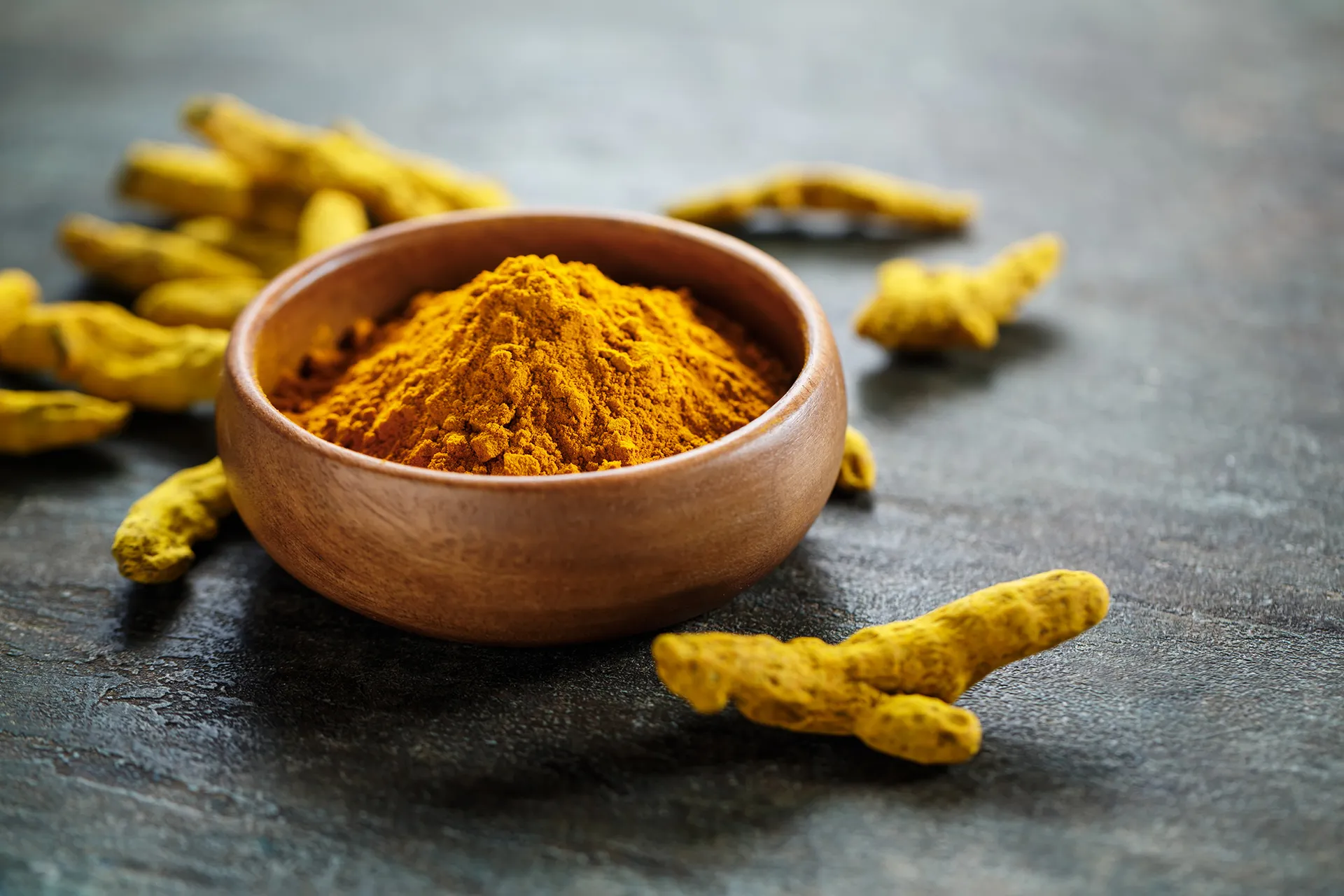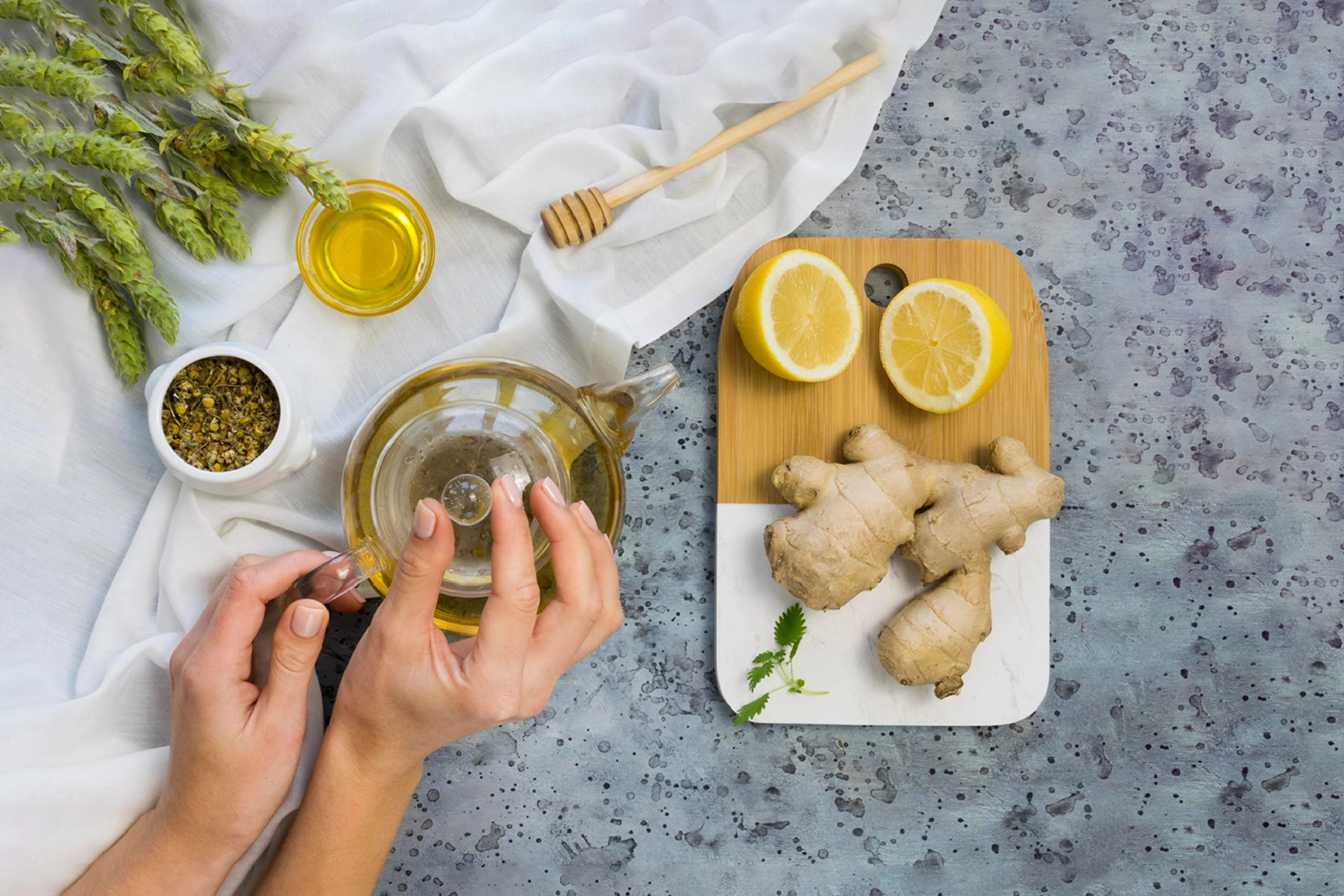Ayurveda | 9 min read
Turmeric: Nutritional Facts, Health Benefits, Potential Risks
Medically reviewed by
Table of Content
Key Takeaways
- Drink a glass of warm turmeric milk to beat the common cold
- Apply turmeric paste with water to treat fungal skin infections
- Make turmeric powder after boiling and drying turmeric roots
If there’s one powerful anti-inflammatory herb you can think of, turmeric definitely tops the list! Turmeric has been used for centuries to treat various ailments. When we talk about turmeric, curcumin is actually the active compound in it that offers health benefits. In fact, the yellow color of turmeric is due to the presence of curcumin.
Whether you have turmeric powder or a tablet, incorporating it in your daily diet helps you boost immunity. Wondering about the best way to prepare it? After boiling and drying fresh turmeric roots, you can ground it in powder form. This powder has a sunset-yellow color. There is also the expensive and rarely available black turmeric which you can use for treating bruises and infections similar to its yellow counterpart.
Read on to understand various health benefits of turmeric.
Nutritional Facts of Turmeric
Approximately nine grams of ground turmeric are included in one tablespoon, so the following nutritional content exists in one tablespoon of turmeric:
- 30 calories
- 6.6 g of carbs
- protein grams
- 0.3 g of fat and 2 g of fiber
- 1.86 milligrams of iron (26 percent DV)
- Iron 5 milligrams (16 percent DV)
- Vitamin B6, 0.01 milligram (6 percent DV)
- 196 mg of potassium (5 percent DV)
- 1.9 mg of magnesium (3 percent DV)
Benefits of Turmeric
1. Reduces inflammation
Inflammation is one of the vital reasons for various health conditions like heart diseases and cancer [1]. It may also affect your cognitive functioning. Having turmeric is beneficial as it prevents the formation of genes that can cause inflammation. The presence of curcumin in turmeric helps in blocking inflammatory response pathway.

2. Protects your cells from free radicals
Free radicals destroy your cells and increase oxidative stress. Since turmeric is packed with antioxidants, it can protect your cells by eliminating free radicals [2]. This helps improve your immune mechanism and brain functioning. The antioxidant properties of turmeric also protect your skin from environmental pollutants. All you need to do is add a teaspoon of turmeric to your smoothie every day and boost the antioxidant capacity of your body.
3. Enhances your immunity
The antimicrobial, anti-inflammatory and antioxidant properties of turmeric make it a potent herb that helps improve your health. The curcumin in turmeric may not get readily absorbed into your bloodstream. To help it in the process, boil a glass of water with turmeric in it, add ground ginger and black pepper to it, and drink the potion. This way your blood absorbs curcumin and it can give you relief from cold. You may also add a pinch of turmeric to a glass of warm milk, and drink it daily to keep infections at bay. If you have fungal skin infections, all you need to do is make a paste of turmeric with water and apply it on the infected area.
Additional Read: Immunity Booster Vegetables4. Decreases your joint pain
Including turmeric in your diet can help in easing your joint pain. According to a study, the powerful anti-inflammatory properties of turmeric are affective in reducing inflammation caused due to arthritis [3]. If you are an athlete and want to reduce muscle soreness, turmeric is the best solution for you. Whip up an interesting smoothie containing blueberries, beets and turmeric and you’ll be amazed when you experience the magic!
5. Promotes heart health
Since turmeric reduces inflammation and destroys free radicals, it protects your heart in many ways. The endothelial function of your heart improves with the intake of turmeric. It is also effective in decreasing cholesterol levels thereby providing protection against heart diseases.
Additional Read: Fruits For Heart Patients6. Improves your mood
Turmeric is effective in treating depression as it helps in reversing negative changes occurring in your brain. Neurotransmitters like dopamine and serotonin play vital roles in elevating your mood levels. By including turmeric in your diet, you can boost the levels of these hormones. As a result, you feel positive, energized and rejuvenated.
7. Boosts brain functions
Turmeric improves the functioning of your brain by increasing the levels of BDNF hormones. This is called brain-derived neurotrophic factor, which plays a key role in sharpening cognitive skills. Sprinkle a pinch of turmeric to your veggies or scrambled eggs and see the result yourself.
8. Gives a glow to your skin
There are numerous benefits of turmeric that can make your skin look beautiful and amazing. A few of them include:
- Decreasing scars on your face
- Preventing formation of acne
- Lightening dark circles under your eyes
9. Blood clots may be slowed or prevented
Turmeric has been proven in laboratory and animal research to help decrease instances of platelet aggregation and may lessen the danger of blood clots from developing. [1]
According to research, curcumin may be a better treatment option for those who need antiarthritic medication yet are at risk for vascular thrombosis. [2]
10. Reduces obesity
Based on laboratory findings, research published in the journal Biofactors suggested that curcumin may aid in reducing the proliferation (growth) of fat cells. Researchers discovered that curcumin's anti-inflammatory qualities helped reduce obesity's inflammatory processes and, as a result, helped to lessen obesity and its "adverse health impacts." [3]
11. Supports for Detoxification
It is claimed that consuming turmeric and curcumin can improve the liver's ability to detox the body efficiently and guard against the effects of some hazardous carcinogens. For instance, it could support defence against dietary and environmental poisons known as xenobiotics.
Turmeric's antioxidant and anti-inflammatory qualities operate in tandem with this mechanism to support a variety of immunological and hepatic functions.
12. Possibly Can Help Treat or Prevent Some Cancers
Cancer (of different forms, including prostate cancer) is one of the subjects that researchers have studied the most in relation to curcumin and disease reversal. Prostate cancer, pancreatic cancer, and other cancers could benefit from it.How to Add Turmeric in Diet
Turmeric is a very adaptable spice that may be used in a variety of ways, such as:
- Including turmeric in spice blends like curry or barbecue sauce
- Making a homemade dressing using turmeric, vinegar, and equal parts oil and spices
- By using turmeric, you can change up your go-to marinades
Alternately, try these nutritious and delicious dishes created by licensed dietitians:
- Salad with lentils in a jar
- Cumin-lime-turmeric dressing
- Mango smoothie with turmeric
- Curcumin milk
- Gold rush chowder
Additionally, tinctures, fluids, extracts, and capsules containing powdered turmeric are offered as dietary supplements. Turmeric is frequently mixed with bromelain, a protein extract from pineapples, in these products because it improves the benefits and absorption of turmeric.
Online retailers sell vitamins and powdered turmeric.
Before using any supplements, be sure they are safe for you to consume by seeing a doctor.
Side Effects of Turmeric and Potential Risks
Turmeric is relatively safe to use as a seasoning in food. Dr. Jampolis asserts, "From a gastronomic perspective, you probably can't get into trouble." "I advise people to adopt a general anti-inflammatory diet through their food choices."
Turmeric has rarely been demonstrated to induce allergies, particularly following skin contact. This usually manifests as a moderate, itchy rash. However, it can potentially create problems in certain persons at the higher levels utilized in some experimental therapies (1,500 to 2,000 mg per day), including:
- Clotting issues: Blood coagulation issues that might arise after serious trauma or surgery may be mitigated by turmeric. Due to this effect, excessive dosages of turmeric should be avoided by anyone who is using prescription blood thinners.
- Iron shortage: High dosages in one research interfered with iron metabolism in sensitive subjects.
- Low sugar levels: In particular, if you're older, curcumin may enhance the effects of sulfonylureas diabetic medications, according to Dr. Jampolis. That could result in hypoglycemia.
- Renal stones: Oxalates, organic acids found naturally in turmeric, raise the risk of developing kidney stones in individuals predisposed to them.
- Gastrointestinal distress: symptoms include diarrhea and nausea.
- Acid reflux: Gallstones and acid reflux are just two of the stomach issues that turmeric can make worse. It can also lead to bloating.
- Liver damage: If turmeric is consumed in high doses then it can also lead to liver damage.
- Allergies: Consuming excessive amounts of turmeric can induce allergic reactions such as rashes.
Furthermore, high doses of turmeric (often in supplement form) have been linked to potential adverse effects such as:
- Nausea
- Diarrhoea
- A higher risk of bleeding
- Gallbladder contractions that are too vigorous
- Hypotension (lowered blood pressure) (lowered blood pressure)
- Pregnant women's uterine contractions
- Enhanced menstrual flow
How to Use Turmeric
Turmeric Recipes
Of course, this spice may be used in several Indian recipes, and it is almost usually included in a curry powder blend.
Make sure you don't believe the prevailing wisdom that the fat in coconut milk is bad for you. Instead, the fat aids the body's absorption of turmeric.
Turmeric Supplements
Do turmeric curcumin supplements provide the same advantages as powdered turmeric curcumin? Yes, in most circumstances. Curcumin pills, on the other hand, may be considerably more potent.
Although using turmeric in your cooking is a terrific method to get the benefits of spice, turmeric only contains around 3% absorbable curcumin in its powdered form. [3] As a result, you should think about taking it or curcumin as a supplement – some high-quality turmeric tablets contain up to ninety-five per cent curcuminoids. [4]
Turmeric Essential Oil
Turmeric essential oil can be used with turmeric in meals and supplements. Many people like to consume turmeric essential oil that has been CO2-extracted.
Quality is vital here, especially if you consume turmeric essential oil internally. Dilute in water or other liquids at all times. In the morning, for example, you may add one drop to a smoothie.
Add it to frittatas and scrambles
You can add a pinch of turmeric to a frittata, tofu scramble, or scrambled eggs. This is an excellent place to start if you or anyone in your family has never used turmeric, as the colour is well-known and the flavour is mild.
Add it to the rice
When added to plain rice or fancy pilaf, turmeric adds colour and a mild flavour.
Try it with some greens
Turmeric can be added to sautéed or braised greens such as kale, collards, and cabbage.
It's great in soups
When a bowl of vegetable or chicken soup is coloured with golden turmeric, it seems even more comforting.
Make a smoothie out of it
Fresh turmeric root is ideal for juices and smoothies, but a sprinkling of ground spice also tastes delicious. Smoothies typically cover the slightly pungent flavour.
Make some tea
Simmer turmeric with coconut milk and honey to produce an earthy and warm beverage.
Though turmeric provides all these benefits, ensure that you do not consume more than five teaspoons in one day. High turmeric dosage can cause dizziness, acid reflux or headaches. It may also drastically reduce the blood sugar levels in diabetic patients. Keep in mind that having a glass of turmeric milk at night helps treat dry cough at home. You can also have it in your meals or include it as a salad dressing. In case you have health conditions that require expert help, get in touch with specialists on Bajaj Finserv Health. Book a doctor consultation with a doctor close to you in minutes and address your health concerns without any delay.
References
- https://pubmed.ncbi.nlm.nih.gov/12490959/
- https://www.ncbi.nlm.nih.gov/pmc/articles/PMC3195121/
- https://www.ncbi.nlm.nih.gov/pmc/articles/PMC3535097/
Disclaimer
Please note that this article is solely meant for informational purposes and Bajaj Finserv Health Limited (“BFHL”) does not shoulder any responsibility of the views/advice/information expressed/given by the writer/reviewer/originator. This article should not be considered as a substitute for any medical advice, diagnosis or treatment. Always consult with your trusted physician/qualified healthcare professional to evaluate your medical condition. The above article has been reviewed by a qualified doctor and BFHL is not responsible for any damages for any information or services provided by any third party.






